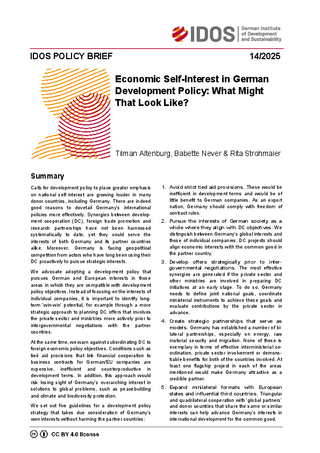Economic self-interest in German development policy: what might that look like?
Altenburg, Tilman / Babette Never / Rita StrohmaierPolicy Brief (14/2025)
Bonn: German Institute of Development and Sustainability (IDOS)
DOI: https://doi.org/10.23661/ipb14.2025
Dt. Ausg. u.d.T.:
Wirtschaftliche Eigeninteressen in der deutschen Entwicklungspolitik: wie kann das aussehen?
(Policy Brief 13/2025)
Calls for development policy to place greater emphasis on national self-interest are growing louder in many donor countries, including Germany. There are indeed good reasons to dovetail Germany’s international policies more effectively. Synergies between develop-ment cooperation (DC), foreign trade promotion and research partnerships have not been harnessed systematically to date, yet they could serve the interests of both Germany and its partner countries alike. Moreover, Germany is facing geopolitical competition from actors who have long been using their DC proactively to pursue strategic interests.
We advocate adopting a development policy that pursues German and European interests in those areas in which they are compatible with development policy objectives. Instead of focusing on the interests of individual companies, it is important to identify long-term ‘win-win’ potential, for example through a more strategic approach to planning DC offers that involves the private sector and ministries more actively prior to intergovernmental negotiations with the partner countries.
At the same time, we warn against subordinating DC to foreign economic policy objectives. Conditions such as tied aid provisions that link financial cooperation to business contracts for German/EU companies are expensive, inefficient and counterproductive in development terms. In addition, this approach would risk losing sight of Germany’s overarching interest in solutions to global problems, such as peacebuilding and climate and biodiversity protection.
We set out five guidelines for a development policy strategy that takes due consideration of Germany’s own interests without harming the partner countries:
1. Avoid strict tied aid provisions. These would be inefficient in development terms and would be of little benefit to German companies. As an export nation, Germany should comply with freedom of contract rules.
2. Pursue the interests of German society as a whole where they align with DC objectives. We distinguish between Germany’s global interests and those of individual companies. DC projects should align economic interests with the common good in the partner country.
3. Develop offers strategically prior to intergovernmental negotiations. The most effective synergies are generated if the private sector and other ministries are involved in preparing DC initiatives at an early stage. To do so, Germany needs to define joint national goals, coordinate ministerial instruments to achieve these goals and evaluate contributions by the private sector in advance.
4. Create strategic partnerships that serve as models. Germany has established a number of bilateral partnerships, especially on energy, raw material security and migration. None of these is exemplary in terms of effective interministerial coordination, private sector involvement or demons-trable benefits for both of the countries involved. At least one flagship project in each of the areas mentioned would make Germany attractive as a credible partner.
5. Expand minilateral formats with European states and influential third countries. Triangular and quadrilateral cooperation with ‘global partners’ and donor countries that share the same or similar interests can help advance Germany’s interests in international development for the common good.




